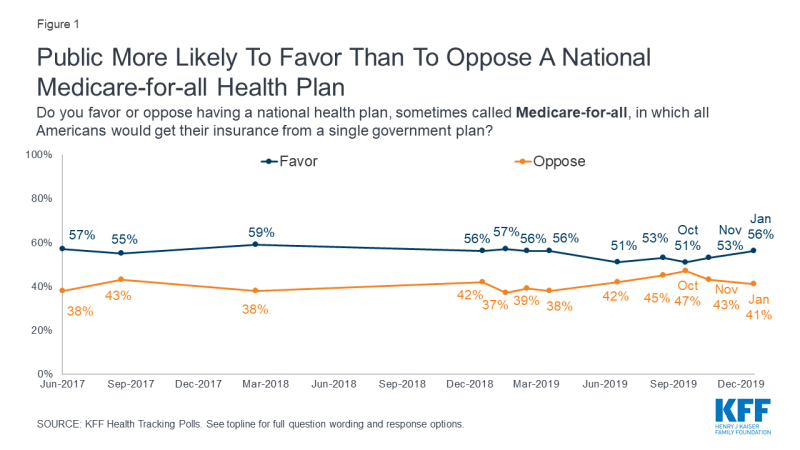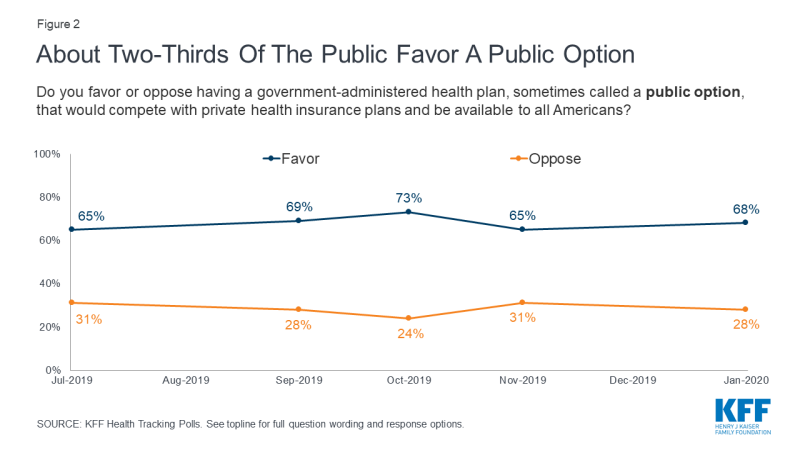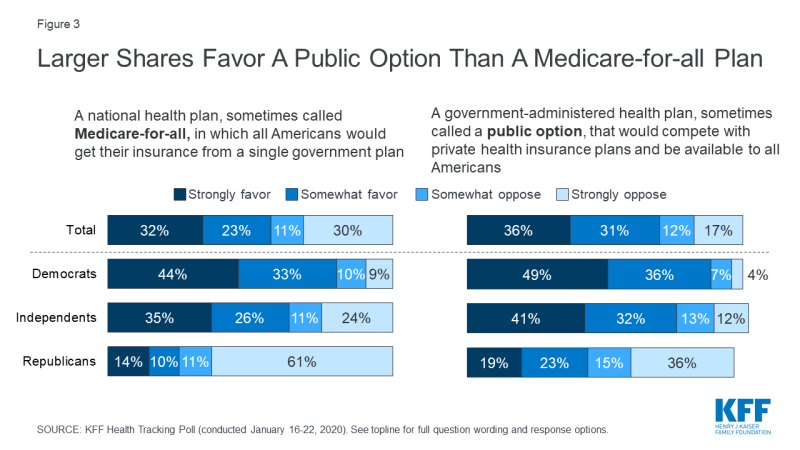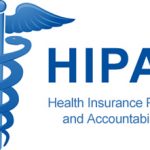Key Findings:
- The Democratic presidential primary campaign featured extensive discussions of different health care reform proposals. As Democratic primary voters in early primary states begin casting their ballots to select their nominee, the latest KFF tracking poll finds that a majority of Americans favor a national Medicare-for-all health plan (56%) but a larger share favors a government-administered “public option” (68%). Notably, nearly half of adults (48%) favor both of these proposals. Among the 17% who favor a public option but oppose Medicare-for-all, when asked to explain their reasoning in their own words, the most common responses indicate that they prefer a public option because it allows choice (32% of those who were asked, or 5% of the total public).
- Eight in ten Americans think taxes for most people would increase both under a Medicare-for-all plan (83%) or a public option health plan available to all (81%). However, more adults think that all Americans would have health insurance coverage under a Medicare-for-all system (62%) than under a public option (53%).
- At the start of this election year, lowering prescription drug costs (22%) and continuing the ACA’s protections for people with pre-existing conditions (19%) lead the public’s health care priorities for Congress. Additionally, eight in ten or more say it is at least very important that Congress work on lowering prescription drug costs (87%), ensuring the ACA’s pre-existing condition protections continue (83%), and protecting people from surprise high out-of-network medical bills (80%) during the next year.
- President Trump has an overall negative approval rating among the public when it comes to his handling of various health issues, with his most negative ratings for his handling of the Affordable Care Act (35% approve and 56% disapprove, for a net approval of -21 percentage points) and his handling of the costs of prescription drugs (30% approve, 54% disapprove, net approval -24 percentage points). On the other hand, majorities of Republicans approve of his handling of all the health care issues asked about in this month’s poll, especially his handling of Medicare (+68 percentage points net approval). Among all adults, President Trump’s net approval rating for his handling of Medicare is -10 percentage points.
- In a December ruling, the U.S. Court of Appeals for the 5th Circuit in Texas agreed with a lower court judge that the provision of the Affordable Care Act’s individual mandate is unconstitutional since Congress eliminated the tax penalty established to enforce it, and sent the case back to the lower court to decide how much of the ACA should be allowed to stand. A majority of adults say they are worried that they or someone in their family will lose health insurance coverage in the future if the Supreme Court overturns either the ACA’s protections for people with pre-existing conditions (57%) or the entire health care law (58%).
Medicare-for-all and Public Option
This month’s poll finds that majorities favor a national Medicare-for-all health plan (56%) and favor a “public option” (68%) in which a government-administered plan would compete with private health insurance and be available to all Americans.
Though both proposed changes to the nation’s health care system have majority support, a public option that would compete with private health insurance plans continues to garner more support than the more sweeping change presented in a Medicare-for-all plan (Click here to see a side-by-side comparison of the competing proposals). Large majorities of Democrats favor both proposals (77% Medicare-for-all, 85% public option), as do majorities of independents (61% Medicare-for-all, 73% public option). Among Republicans, one in four (24%) support a national Medicare-for-all plan and four in ten (42%) favor a public option.
While both proposals aim to expand the role of the federal government in health care, the two plans are very different – which has been highlighted during the recent Democratic presidential primary debates. Yet, nearly half of adults (48%) favor both of these proposals while 22% oppose both. Few (6%) say they favor Medicare-for-all but oppose a public option while 17% favor a public option, but oppose Medicare-for-all.
When those who favor a public option but oppose Medicare-for-all are asked to explain their reasoning in their own words, the most common responses indicate that people like that a public option is not forced, but instead is an option that allows choice (32% of those who were asked, or 5% of the total public). Thirteen percent of those who were asked (2% of total) mentioned competition among private plans as the reason they support a public option but not Medicare-for-all. Smaller shares mention that it would allow people to keep their current plans, concerns about cost and increased taxes for a Medicare-for-all plan, or concerns about government involvement in health care (each named by 7% of those who were asked, or 1% of the total public).
Want to publish your own articles on DistilINFO Publications?
Send us an email, we will get in touch with you.
Source: KFF










